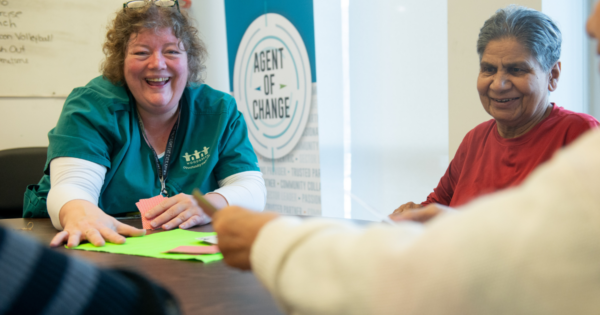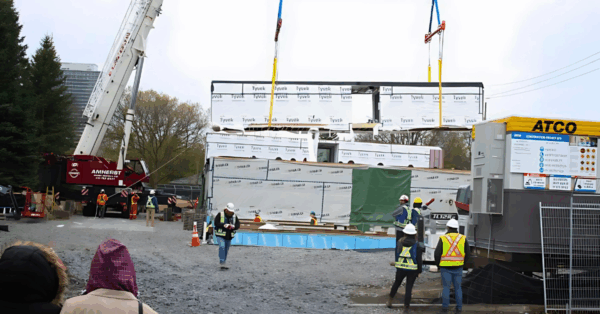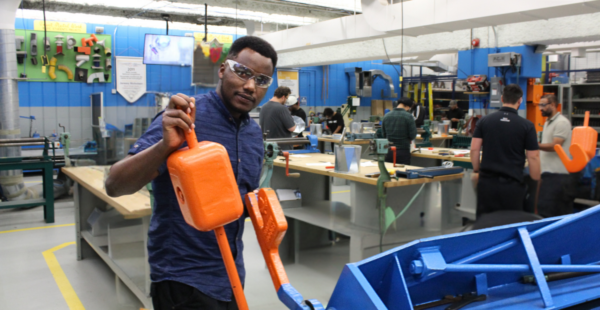Research has shown that when major crises hit our society, newcomers’ health and wellness tend to experience the shorter end of the stick. We have seen this firsthand in Ontario during the COVID-19 pandemic. Here, newcomers account for 43.5 per cent of all the province’s COVID-19 cases, even though they are only 25 per cent of the population.
As Canada plans to welcome over 1.2 million newcomers in the next three years, ensuring that they settle into our communities successfully is more important than ever. And one way to do this is through integrated care.
Today, we released a new report, Resettling Health and Wellness: The Value of Integrated Newcomer Care, which takes a closer look at how integrated care programs, like our Inter-Professional Care (IPC) program that is the first of its kind in Toronto, can improve the health and well-being of newcomers. It is also an urgent call to expand these programs across Canada.
Read the full report or the executive summary.
There are gaps in Canada’s care systems — and newcomers are falling right through them

On average, newcomers come to Canada in better health than the general population. However, their health and wellness tend to rapidly decline during the settlement process due to the social determinants of health (the conditions in which people are born, live, work and/or age, and the broader economic, social, and political forces that shape the conditions of their daily life). At WoodGreen, we have seen the impacts of this on our clients. Many of our newcomer clients do not have secure housing, access to healthcare, and/or have enough to eat.
To date, Canada’s health care services and settlement services have mainly operated in silos and are funded by different levels of government (the federal government is in charge of funding settlement services, while the province is responsible for healthcare). This often leaves many newcomers unsure of what services are available and how to access them. In addition to facing other challenges navigating these systems, like language barriers, these gaps in health and settlement service integration are growing — leaving newcomers to fall right through them.
Why integrated care is the solution

Integrated care can help to close these gaps. It’s an approach that puts the person at the centre and builds a basket of services around their needs. For newcomers, this means pairing settlement services with medical services all in one spot.
An example of this is WoodGreen’s IPC program. The program connects patients with both a primary health care professional and a settlement counsellor and provides clients with services like health care, housing assistance, and government benefits support all in one location. Many of our clients have said that the program has taken the stress out of accessing care and has improved their health and well-being. The success of the IPC model is reliant on many partnerships, notably working with member organizations of the East Toronto Health Partners (ETHP).
There are many benefits to this type of program. First, it improves the quality and experience of newcomer care by making the system easier to navigate and improving the continuation of services. Secondly, it improves newcomer health and wellness by addressing the whole person, including tackling the social determinants of health. Third, it prevents burnout amongst care professionals. And, lastly, it improves the efficiency, cost-effectiveness, and sustainability of care systems by breaking down silos between health, settlement services and other services.
The service model has also played a direct role in WoodGreen’s response to the COVID-19 pandemic. For example, by bringing COVID-19 testing services to Crescent Town, WoodGreen’s IPC team, working alongside members of the ETHP, was able to test 410 people in the community in only eight days, finding seven positive cases that would have otherwise gone undetected and spread throughout the community.
Now is the Time for Integrated Newcomer Care
COVID-19 has shown how important it is for communities and care systems to be resilient. Stronger and more resilient care systems and communities are better able to cope, respond, and adapt to new challenges and crises such as the current pandemic. They are also able to quickly come together to act as one and collaborate across disciplines and sectors towards a common goal.
Looking at health through a lens of inclusion and integration of services can lead to better outcomes for many. However, for integrated newcomer care models to expand and succeed, policy changes and financial supports are needed. We need to recognize settlement as a health and wellness issue – and urgently. Because when newcomers thrive, we all thrive.





